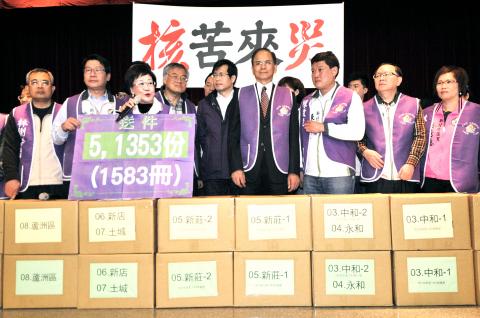Former vice president Annette Lu (呂秀蓮) yesterday submitted a proposal that aims to prevent fuel rods from being installed at the Fourth Nuclear Power Plant to the New Taipei City (新北市) government.
Along with the proposal, Lu submitted 51,353 letters and a list of reasons why the fuel rods should not be installed to the city’s election committee.
Lu was received by New Taipei City Government Secretary-General Chen Shen-hsien (陳伸賢), but was unhappy that New Taipei City Mayor Eric Chu (朱立倫) was not there. Lu said Chu’s absence showed his contempt for the initiative and disregard for the safety of the city’s 3.9 million residents.

Photo: Chen Chih-chu, Taipei Times
The former vice president launched a similar petition in July last year to put the loading of fuel rods — as well as eventual operation of the nuclear power plant — to a local vote.
The initiative won support from the Democratic Progressive Party and the Taiwan Solidarity Union. However, the utility and legitimacy of holding a local referendum was thrown into doubt when Premier Jiang Yi-huah (江宜樺) last week proposed a plan to hold a national referendum on the construction of the Fourth Nuclear Power Plant.
Jiang and the Chinese Nationalist Party (KMT) said the plant’s construction is a matter of national energy policy and power generation, and should therefore be decided with a national referendum rather than a local one.
Lu responded that holding a local referendum on the matter was authorized by the Act Governing New Taipei Referendums (新北市公民投票自治條例), passed by the New Taipei City Council in June last year, and was a local matter.
Article 11 of the Act on Sites for Establishment of Low Level Radioactive Waste Final Disposal Facility (低放射性廢棄物最終處置設施場址設置條例) stipulates that a local referendum be held in the city where a site is located within 30 days of it being publicly announced, and is not subject to the provisions of Article 2 of the Referendum Act, (公民投票法) Lu added.

The Ministry of Economic Affairs has fined Taobao NT$1.2 million (US$36,900) for advertisements that exceeded its approved business scope and ordered the Chinese e-commerce platform to make corrections in the first half of this year or its license would be revoked. Lawmakers have called for stricter supervision of Chinese e-commerce platforms and more stringent measures to prevent China from laundering its goods through Taiwan as US President Donald Trump’s administration cracks down on origin laundering. The legislature’s Finance Committee yesterday met to discuss policies to prevent China from dumping goods in Taiwan, inviting government agencies to report on the matter. Democratic Progressive Party

Taiwan and its Pacific ally Tuvalu on Tuesday signed two accords aimed at facilitating bilateral cooperation on labor affairs, according to Taiwan’s Ministry of Foreign Affairs (MOFA). The governments inked two agreements in Taipei, witnessed by Foreign Minister Lin Chia-lung (林佳龍) and visiting Deputy Tuvaluan Prime Minister Panapasi Nelesone, MOFA said in a news release. According to MOFA, the agreements will facilitate cooperation on labor issues and allow the two sides to mutually recognize seafarers’ certificates and related training. Taiwan would also continue to collaborate with Tuvalu across various fields to promote economic prosperity as well as the well-being of their

Taiwan would welcome the return of Honduras as a diplomatic ally if its next president decides to make such a move, Minister of Foreign Affairs Lin Chia-lung (林佳龍) said yesterday. “Of course, we would welcome Honduras if they want to restore diplomatic ties with Taiwan after their elections,” Lin said at a meeting of the legislature’s Foreign Affairs and National Defense Committee, when asked to comment on statements made by two of the three Honduran presidential candidates during the presidential campaign in the Central American country. Taiwan is paying close attention to the region as a whole in the wake of a

NEW WORLD: Taiwan is pursuing innovative approaches to international relations through economics, trade and values-based diplomacy, the foreign minister said Taiwan would implement a “three-chain strategy” that promotes democratic values in response to US tariffs, Minister of Foreign Affairs Lin Chia-lung (林佳龍) said. Taiwan would aim to create a “global democratic value chain,” seek to capitalize on its position within the first island chain and promote a “non-red supply chain,” Lin was quoted as saying in the ministry’s written report to the Legislative Yuan submitted ahead of the legislature’s Foreign Affairs and National Defense Committee meeting slated for today. The Ministry would also uphold a spirit of mutual beneficial collaboration, maintaining close communication and consultations with Washington to show that Taiwan-US cooperation